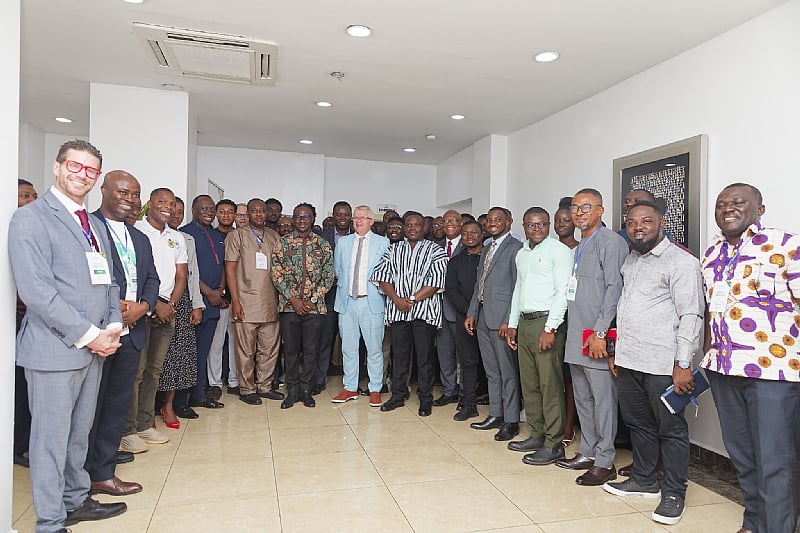Ghana stands on the cusp of a technological revolution, poised to leverage the transformative power of Artificial Intelligence (AI) to propel its economy to new heights. Darlington Akogo, a prominent AI entrepreneur, projects a potential $20 billion surge in Ghana’s GDP by 2030 through strategic AI development and adoption. This projection underscores the immense economic opportunity AI presents, dwarfing the contributions of traditional sectors like gold, cocoa, and oil. Akogo highlights the remarkable return on investment (ROI) potential of AI, estimating it to be 6.4 times higher than other major revenue streams within a mere seven-month period. This makes AI not just a promising venture but arguably the most lucrative investment Ghana could make at this juncture. To accelerate this AI-driven growth, Akogo advocates for a national AI fund ranging from $500 million to $1 billion. This investment, he believes, will be instrumental in fostering innovation and bolstering Ghana’s digital economy, impacting diverse sectors from agriculture and healthcare to mining and finance.
The impetus for this transformative vision is the ongoing development of a National AI Strategy, spearheaded by the Ministry of Communication, Digital Technology and Innovations in collaboration with the British High Commission. This initiative involves comprehensive consultations with stakeholders across government, academia, civil society, and the private sector. The goal is to create a robust and inclusive strategy that positions Ghana at the forefront of responsible AI deployment. The Responsible AI Lab (RAIL) at the Kwame Nkrumah University of Science and Technology (KNUST), under the leadership of Prof. Jerry John Kponyo, has been entrusted with the crucial task of developing this national strategy.
Minister Samuel Nartey George underscores the government’s recognition of AI as a national priority. He emphasizes the importance of not just data collection, but the intelligent application of that data to revolutionize key areas like smart city development, healthcare delivery, and financial inclusion. This reflects a forward-thinking approach that recognizes the potential of AI to address critical national challenges and drive sustainable development. A key component of this national AI agenda is the government’s ambitious “1 Million Coders Programme,” an initiative designed to equip Ghanaian youth with the essential digital skills needed to thrive in the future tech-driven world. This program demonstrates the government’s commitment to investing in human capital and building a future-ready workforce capable of harnessing the power of AI.
The government’s commitment goes beyond skills development and extends to providing the necessary infrastructure, fostering strategic partnerships, and implementing innovation-friendly policies. These supportive measures are crucial for creating an enabling environment for the successful rollout of the national AI strategy and ensuring widespread adoption of AI technologies across various sectors. Prof. Kponyo, leading the development of the strategy at RAIL, outlines the key focus areas, including education, ethics, governance, industry development, and data regulation. This comprehensive approach highlights the commitment to responsible AI development, acknowledging the ethical and societal implications of AI and the need for robust governance frameworks.
The development of the National AI Strategy is not merely a technical exercise but is viewed by RAIL as a “sacred duty” with profound implications for Ghana’s future. The aim is to finalize and implement the strategy by June 2025, thereby establishing Ghana as a regional leader in responsible and inclusive AI deployment. This ambitious timeline reflects the urgency and importance attached to AI development and the desire to quickly capitalize on its transformative potential. The collaborative approach adopted by RAIL, involving partners from various sectors, ensures that the strategy is well-rounded, practical, and aligned with the needs of different stakeholders.
This national endeavor towards AI adoption is part of a broader digital transformation agenda that seeks to ensure equitable access to technology, foster innovation, and build resilience in the face of emerging technological challenges and opportunities. The strategic development and implementation of a comprehensive National AI Strategy represent a significant step towards achieving this vision. It signals Ghana’s commitment to harnessing the power of AI for economic growth, social development, and national progress, ultimately positioning the country as a leader in the African digital landscape. The potential $20 billion boost to GDP by 2030 is not just a statistic but a testament to the transformative potential of AI and the foresight of Ghana’s leadership in embracing this technological frontier.














